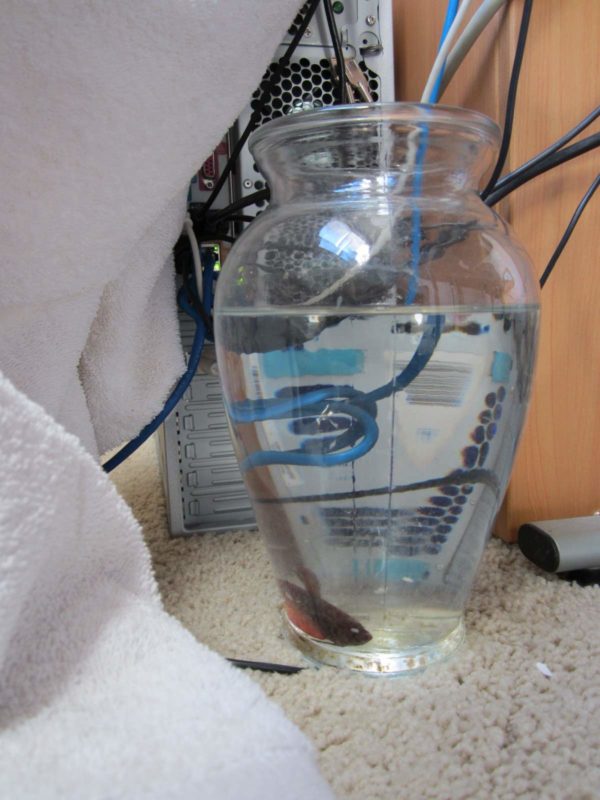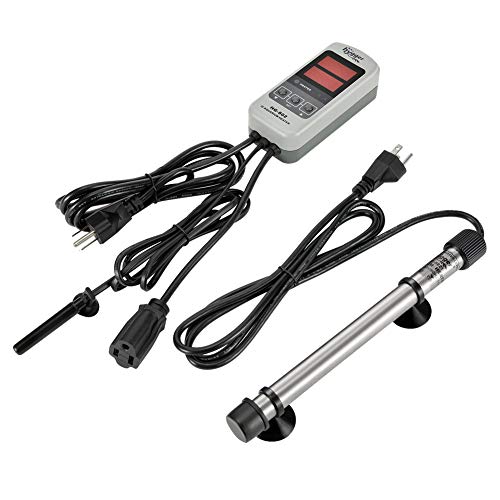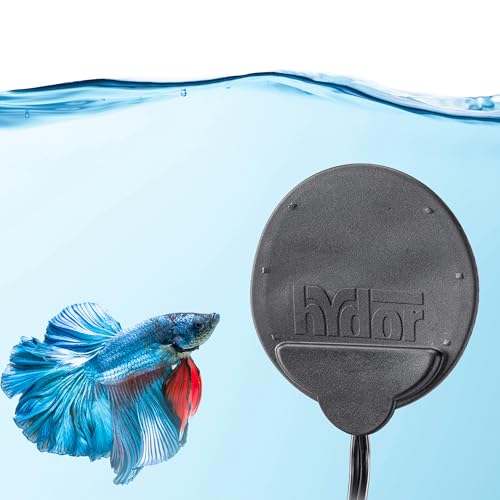Betta fish are popular native fish of Thailand, and these hardy fish can survive in most conditions. While they can survive at room temperature, they are tropical fish and require a heater to maintain optimal water temperatures.
Only at the right temperature will different types of Bettas thrive. Cold water affects their digestion, causes stress, and leads to sick Bettas. For healthy Bettas, you should invest in a decent tank setup of at least 2.5 gallons, a filter, and a heater. Let’s start with the heater.

Table of Contents
Are Heaters a Requirement for Betta Fish?
Yes, Bettas need a heater as they are tropical fish that live in waters with a temperature of 68℉ to 72℉. Even in warm climates, your home temperature fluctuates, which isn’t healthy for a Betta fish. Regulating tank water at the optimal temperature will ensure healthy, happy, and thriving Betta fish.
Let us look at why a heater is so necessary for a Betta tank.
Why Betta Fish Need a Heater
Betta fish are tropical fish, and they are native to the waters of South-East Asia. Any temperatures below 68℉ will cause Bettas to become lethargic and sicken. Temperatures over 72℉ can lead to other health complications. When the temperature rapidly fluctuates between highs and lows, it can lead to your Bettas becoming stressed and dying.
Using a heater is vital as it means your Betta fish live in a regulated environment where they won’t get stressed by sudden increases or decreases in temperature (such as at night). Even in warmer parts of the world, temperature changes are natural, but these aren’t ideal for Betta fish, which is why a heater is essential for your Betta aquarium.
Remember that Bettas, like all fish in captivity, depend on you to survive. This helpful guide will help you create an optimally temperature-controlled environment for your prize Bettas.
How Important Is A Heater For Bettas?
Fish require steady water temperatures to avoid sickening. Sudden changes in water temperature can affect their digestion, breathing, and even immunity. Keeping Bettas in a heated environment can be challenging as people often keep them in a small bowl or tank, which means there’s limited space for a heater or filter.
The lack of clean water, changes in water temperature, and the small space are the elements of a recipe for disaster if you’re a Betta fish. For your Betta fish to thrive, you will have to take steps to clean the water frequently and maintain a regulated optimal water temperature.
How Do I Choose a Heater for My Betta?

Heaters are inexpensive, especially those needed for smaller Betta tanks. However, some heaters will work better in a specific tank than others.
You can choose between different size heaters, and it’s important that you find a heater that will work for your tank’s volume. There are heaters for large 150-gallon tanks and even heaters for nano tanks as little as 5 gallons.
You can consider many different heater types, such as fully or partially submersible, adjustable, and preset heaters. Before choosing, let’s look at the different heater types so you know what you’re getting.
1. Fully and Partially Submersible Heaters
These heaters are the best, as you can place them into your tank water. They require less space. These are best for smaller tanks and odd-shaped tanks. A fully submerged heater must be completely below the water surface to ensure it doesn’t overheat.
The partially submersible heater usually has a top section above the water line. We recommend getting a fully submersible heater (even though they cost a little more than the partially submersible ones) as these heat more tank water and achieve a more even heating effect.
2. Hang-on-Tank Heaters
Traditionally, the hang-on-back heater was the heater of choice. It hooks onto the back of your tank and heats the section around the heater. They are less popular today as they’re less consistent in the heating achieved. However, these heaters are still a good choice for a smaller tank.
3. Adjustable Heaters
With adjustable heaters, you have complete control of the temperature you want to set for your tank. Aquarists use two varieties of adjustable heaters. The first has a marked dial so you can choose the temperature yourself.
The second variety has a knob that you can turn around to set the temperatures according to two settings: plus and minus. Adjustable heaters often have a light that blinks when the heater is heating the water. You are free to adjust the temperature set point. Use a thermometer to check if your heater is accurate.
Then, once the heat has warmed the tank water to the temperature best suited to your fish, you need to turn the knob again to switch the heater off if it doesn’t have an inbuilt shut-off, or some heaters may automatically switch off.
4. Preset Heaters
As their name suggests, preset heaters come with predetermined settings. Preset heaters have limited functionality as you can’t change the temperature. These heaters come with a fixed temperature range, and there are only two functions on them: on and off.
These heaters can be inconvenient as you can’t make substantial changes in water temperature. However, these are usually the cheapest options available. This is a good option if you have only a couple of Bettas in a bowl.
5. Heater Shapes
Heaters also come in different shapes and sizes. Nowadays, the old designs, including an external suction cup, need to be more functional. Instead, some heaters are flat or may be rectangular and even bullet-shaped. There are also specific Betta fish heaters that are round so they can fit at the bottom of your fishbowl!
These heaters are shaped so they can be placed under your substrate. So you don’t even have to find a hiding place!
Most heaters don’t include a thermometer to check the temperature. You must get a thermometer and use it in line with your heater. Thermometers are cheap and will ensure you are not overheating and underheating the tank.
Betta-Friendly Fish Tank Heaters
Here are the best Betta fish heaters to consider for your tank.
1. Hygger 200W Titanium Aquarium Heater
While Betta fish are often kept alone in a small tank or bowl, you can successfully keep 3-6 female fish in a large enough tank. You will require a large enough heater to handle the extra water volume for this setup. The Hygger 200-watt heater is ideal for a larger tank, maintaining the water temperature at a steady 76℉ to 82℉.
The Hygger Titanium Aquarium heater is available in four sizes, ranging from 50 watts (5-15 gallons) to 500 watts (60-120 gallons). So whether you have a small-size nano tank or a large-size aquarium, there’s a heating solution for you.
The unit comes with Fahrenheit or Celsius temperature settings, so you can set your preference before setting the temperature you wish to maintain. With a sensitivity function of less than 1℉, you know that the heater will automatically start working if the water temperature drops below your desired setting.
The heater has a thermometer to help manage the tank heating. Simply install the heater horizontally and the thermometer as far from the heater as you can. Mount the controller unit with the wall-mounting fittings, and you’re good to go.
Pros
- Perfect for saltwater or freshwater tanks
- Temperature range of 32℉ to 104℉
- Preset the temperature range you’d like to maintain for your Bettas
- Thermometer sensitivity is 0.2℉, with the heater starting if the range is exceeded by 1℉
- Easy to set the temperature range
Cons
- There are no WiFi settings to manage the temperature remotely
Also Read: Guppy Fish Water Temperature (Maximum And Minimum)
2. Hydor ETH 300In-Line External Heater Aquarium Heater
No products found.
Our next option is also a Hydor, but it makes the list as it’s a super easy and reliable in-line heater. Installing the heater couldn’t be more efficient and convenient. Simply set the temperature dial to your desired temperature settings, then attach your ⅝ inch hose between the inlet and the canister filter and from the outlet to the tank.
There’s no external thermometer, so if you want to verify the tank temperature, you’d do well to install a small thermometer in the tank. As the water passes through the heater outside the tank, the water is heated to the desired temperature, which provides a steady inflow of correctly heated water.
The heater is super easy to maintain, and if your Bettas get a bit frisky, they can’t break the heater housing as it’s outside the tank.
Pros
- Available in three models from a 200 watts ½ inch unit to a 300 watts ⅝ inch unit
- Easy to install and maintain
- Less chance of overheating the tank water
- Better accuracy with the water temperature that is returned to the tank
- Suitable for freshwater and saltwater aquariums
Cons
- You may require a secondary heater in elongated tanks where the water cools by the time it reaches the other side of the tank
3. HiTauing Aquarium Heater
In-tank heaters often have one problem in common – they can burn fish if the fish swim right up against the heater’s body. The HiTauing Aquarium Heater doesn’t have this problem, thanks to the anti-scald shell that slips over the heater body, creating a safety pocket that keeps your fish away from the heater coils and housing.
This heater includes an external controller unit, allowing you to choose between Fahrenheit and Celsius, adjust the temperature, and control the heater’s over-temperature feature.
Choose one of the five available heater sizes, starting at a 50-watt heater and maxing out at a 500-watt one to best suit your tank size. The temperature range of the heater is 63℉ to 94℉, so it allows you to preset a selection that works for your Bettas.
Pros
- The anti-scald shell protects fish from burning
- Easy to install and use
- Overheating protection
- Extra-length power cable for better setup capabilities
- Very affordably priced
Cons
- Not the most aesthetic-looking heater, and you can’t hide it in your sump tank
4. Orlushy Submersible Aquarium Heater
The Orlushy is a submersible heater that’s extremely basic and incredibly reliable. It’s perfect if you want to slip it through the tank hood and drop it into the water. You can also install the heater with the suction cups to the inside of your tank if that works better for you, and you can easily hide it with some aquatic plants.
This heater is available in seven sizes, ranging from 25 watts up to 500 watts, so you can quite easily find a size that works on your nano size tank and even that large 150-gallon tank you’ve been eyeing.
The quartz housing of the heater is safe to use in saltwater or freshwater aquariums, and you can expect a temperature range of 68℉ to 89℉, with a one-degree variance. The heater has a separate digital thermometer, which lets you track whether the tank reaches the required temperatures.
The top of the heater has a dial that lets you simply set the temperature you require, and once the tank is as warm as you desire, the heater automatically shuts off.
Pros
- Excellent price
- The 25 watts heater is perfect for a small fish bowl or nano tank with one or two Bettas
- Very easy to install and operate
- An additional digital thermometer is a nice touch
- Made from quality materials
Cons
- The temperature range can fluctuate more than other thermometers
5. Hydor Betta Bowl Slim Fish Tank Heater
When your tank or bowl is not standard shaped, opting for a round heater that can be slipped unobtrusively under the tank gravel or substrate may be a real winner. The Hydor Betta Bowl slim heater is ideal for a Betta tank or bowl. It’s designed to be as “invisible” as possible while delivering excellent service.
The round or oval-shaped heater pad is available in four sizes, from 4 watts up to 15 watts, and you can choose between a round shape or an oval shape, depending on your tank or bowl. With the heater submerged in the tank bottom, it’s unlikely that you’ll have to worry about the heater overheating or running dry.
Since the power cable exits the heater pad at 90 degrees, you can use this heater in any tank, as the cable is easy to hide and won’t pull the heater out of place. While the heater is effective in small bowls, it’s not ideal in frigid climates as the temperature rate is only 5℉ to 10℉ above room temperature. There is also no temperature regulation, and you’ll have to manually switch off the heater if you suspect it’s overheating.
Pros
- Much smaller space footprint
- Easy to install
- Fits round aquariums and bowls
- Provides a simplistic solution to increasing the tank temperature by no more than 5℉ to 10℉
Cons
- Limited pre-selection of the tank temperatures, and you’ll have to buy your own thermometer to manage your tank temperatures
What Are the Signs of an Ill Betta Fish?
The first sign of a Betta feeling distressed is that it appears sluggish and lethargic. The Betta is trying to slow its metabolism, conserving energy to form heat to survive in a too-cold tank.
The Betta might completely stop eating as it gets weaker. There are other reasons why Betta fish may not eat, such as disease, bloat, and overfeeding.
You might also notice your Betta lying on its side. This is a case of extreme fatigue, and your Betta is nearing death.
Due to weakness and loss of energy, you will notice the Betta becoming pale. Even the scales of the fish might appear pale and dull. When the water drops below the required minimum for Bettas, the Betta’s circulatory system starts to shut down, which removes heat from its extremities. Your Betta’s fins will discolor and lose their flexibility due to the lack of blood flow. Your Betta fish will be more vulnerable to infections or bacteria that might attack them since they are cold.
Common illnesses, such as bacterial and fungal infections, fin rot, dropsy, etc, can more easily affect fish kept in water that’s too cold.
As an aquarist, you must look for constant signs of ill health among your fish. Act quickly to get them treated as soon as possible by a professional.
FAQs
Betta fish prefer a warm tropical temperature range of 76℉ to 82℉, but those in the know believe the sweet spot for absolutely vibrant Bettas to be 78℉ to 80℉. Of course, this is a narrow window to maintain tank temperatures, so you must always invest in a quality heater to stabilize the water temperature.
No fish does well in extreme temperature changes. Even the hardiest fishes struggle to adapt if the temperature of their habitat gets too cold or too hot. Bettas are the same. Bettas are used to warm water, but that does not mean they can tolerate hot water. The same goes for frigid water.
If your Betta gets too cold, it is because the tank temperature has dropped below 74℉ while temperatures over 82℉ become too hot for Bettas to thrive.
Most fish can only remain healthy in a constant water temperature. If your heater is overheating the tank, or if your tank is in a place where it gets boiling, it spells disaster for your Betta.
The first sign of heat-induced illness that you will notice is that your fish swims strangely or erratically. This is because the extra heat around them will give them more energy and cause stress by making them hyperactive. The same result will follow; their immune system will weaken, and they’ll be prone to diseases. In extreme cases, your heat-stressed Betta may suffer heart attacks and die.
On extremely hot days, reduce the heat from your tank heater and place a fan next to the tank to help reduce the water temperature.
Wrapping Up
As we have seen, Bettas are sensitive to water temperature fluctuations. If you want your Betta to thrive in the tank, keep the water temperature at a constant 76℉ to 82℉.
Invest in a bigger tank, and monitor the temperature and the fish for any strange behavior or changes. The secret to good fish rearing is to be attentive and notice signs of distress amongst the fish.
One of the surest ways to ensure that your Betta stays in optimum condition is to maintain healthy water parameters with good filtration, aeration, and appropriate heating. Choose a tank heater that will offer the most reliable service and is suitable for the size of your tank. Check your tank temperature frequently with a thermometer to ensure your heater works correctly.
Without correct care, your Betta fish will sicken and die. With the steps above, you can prevent this tragedy.




